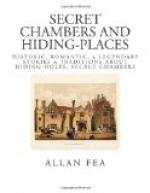Now for the hiding-place. Between this and “my Lady Wyndham’s chamber” (the aforesaid panelled room that was kept exclusively for Charles’s use) was a small ante-room, long since demolished, its position being now occupied by a rudely constructed staircase, from the landing of which the hiding-place is now entered. The small secret apartment is approached through a triangular hole in the wall, something after the fashion of that at Ufton Court; but when one has squeezed through this aperture he will find plenty of room to stretch his limbs. The hole, which was close up against the rafters of the roof of the staircase landing, when viewed from the inside of the apartment, is situated at the base of a blocked-up stone Tudor doorway. Beneath the boards of the floor—as at Boscobel and Moseley—is an inner hiding-place, from which it was formerly possible to find an exit through the brew-house chimney.
It was from Trent House that Charles visited the Dorsetshire coast in the hopes of getting clear of England; but a complication of misadventures induced him to hasten back with all speed to the pretty little village of Trent, to seek once, more shelter beneath the roof of the Royalist Colonel Wyndham.
To resume the King’s account:—
“As soon as we came to Frank Windham’s I sent away presently to Colonel Robert Philips [Phelips], who lived then at Salisbury, to see what he could do for the getting me a ship; which he undertook very willingly, and had got one at Southampton, but by misfortune she was amongst others prest to transport their soldiers to Jersey, by which she failed us also.
“Upon this, I sent further into Sussex, where Robin Philips knew one Colonel Gunter, to see whether he could hire a ship anywhere upon that coast. And not thinking it convenient for me to stay much longer at Frank Windham’s (where I had been in all about a fortnight, and was become known to very many), I went directly away to a widow gentlewoman’s house, one Mrs. Hyde, some four or five miles from Salisbury, where I came into the house just as it was almost dark, with Robin Philips only, not intending at first to make myself known. But just as I alighted at the door, Mrs. Hyde knew me, though she had never seen me but once in her life, and that was with the king, my father, in the army, when we marched by Salisbury some years before, in the time of the war; but she, being a discreet woman, took no notice at that time of me, I passing only for a friend of Robin Philips’, by whose advice I went thither.
“At supper there was with us Frederick Hyde, since a judge, and his sister-in-law, a widow, Robin Philips, myself, and Dr. Henshaw [Henchman], since Bishop of London, whom I had appointed to meet me there.




